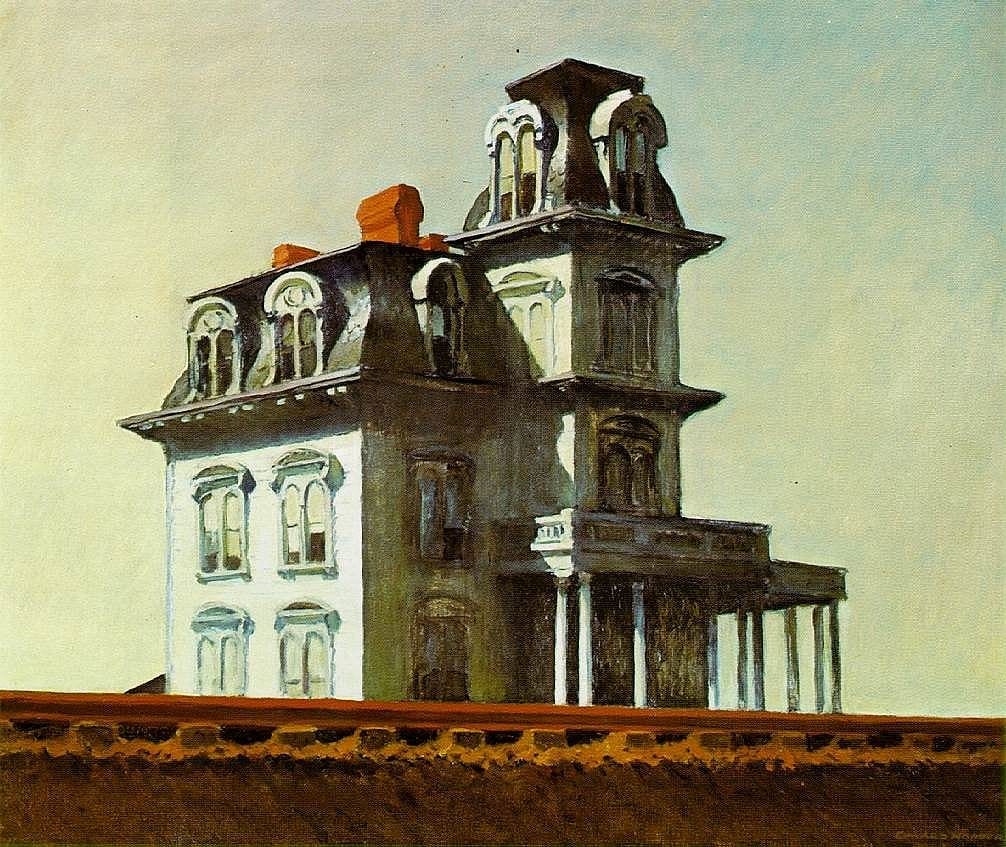[ezcol_1half]
–
House by the Railroad
Date:1925
Medium: Oil on canvas
Dimensions:24 x 29″ (61 x 73.7 cm)
Credit Line:Given anonymously
MoMA Number:3.1930
–
Edward Hopper y la casa junto a la vía
–
Aquí fuera en el centro exacto del día,
esta casa desgalichada y rara tiene la expresión
del que sufre una mirada fija, del que contiene
el aliento bajo el agua, mudo y expectante;
–
esta casa se avergüenza
de sí misma, de sus mansardas fantasiosas
y su porche pseudogótico, se avergüenza
de sus hombros y sus manazas torpes.
–
Pero el hombre del caballete es implacable.
Es tan brutal como el sol, y cree
que la casa tuvo que hacer algo espantoso
a los que en otro tiempo la habitaron
–
para estar ahora tan atrozmente vacía,
tuvo que hacerle algo al cielo
para que también el cielo esté desierto
y no diga nada. Por ningún lado
–
crecen árboles ni arbustos: la casa
tuvo que hacerle algo a la tierra.
Lo único presente es una sóla vía
que va recta a lo lejos. No pasa el tren.
–
Ahora el forastero viene por aquí a diario,
y la casa sospecha que también él
está desolado; desolado
y avergonzado, incluso. La casa empieza
–
a mirarle de frente. Y sin saber cómo,
la tela en blanco va tomando despacio
la expresión de alguien acobardado,
que contiene el aliento bajo el agua.
–
Hasta que un día el hombre se va.
Es una última sombra de la tarde
que atraviesa la vía y se encamina
por el inmenso campo anochecido.
–
Pintará otras mansiones abandonadas,
y cristaleras de cafetería borrosas, y escaparates
mal rotulados al borde de los pueblos.
Tendrán siempre la misma expresión,
–
la desnudez total de alguien que sufre
una mirada fija, alguien americano y desgalichado.
Alguien que va a quedarse solo
una vez más, y ya no lo soporta.
[/ezcol_1half][ezcol_1half_end]–
–
Edward Hopper and the House by the Railroad
–
Out here in the exact middle of the day,
This strange, gawky house has the expression
Of someone being stared at, someone holding
His breath underwater, hushed and expectant;
–
This house is ashamed of itself, ashamed
Of its fantastic mansard rooftop
And its pseudo-Gothic porch, ashamed
of its shoulders and large, awkward hands.
–
But the man behind the easel is relentless.
He is as brutal as sunlight, and believes
The house must have done something horrible
To the people who once lived here
–
Because now it is so desperately empty,
It must have done something to the sky
Because the sky, too, is utterly vacant
And devoid of meaning. There are no
–
Trees or shrubs anywhere–the house
Must have done something against the earth.
All that is present is a single pair of tracks
Straightening into the distance. No trains pass.
–
Now the stranger returns to this place daily
Until the house begins to suspect
That the man, too, is desolate, desolate
And even ashamed. Soon the house starts
–
To stare frankly at the man. And somehow
The empty white canvas slowly takes on
The expression of someone who is unnerved,
Someone holding his breath underwater.
–
And then one day the man simply disappears.
He is a last afternoon shadow moving
Across the tracks, making its way
Through the vast, darkening fields.
–
This man will paint other abandoned mansions,
And faded cafeteria windows, and poorly lettered
Storefronts on the edges of small towns.
Always they will have this same expression,
–
The utterly naked look of someone
Being stared at, someone American and gawky.
Someone who is about to be left alone
Again, and can no longer stand it.
[/ezcol_1half_end]
–
Edward Hirsch
–
from Wild Gratitude
Edward Hopper and the House by the Railroad (1925)
–



0 comentarios